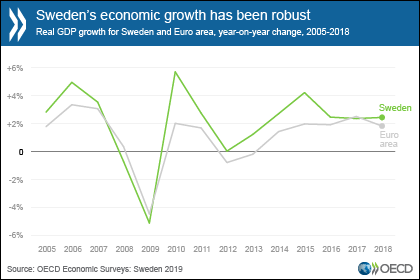Further reforms in Sweden can drive growth, competitiveness and social cohesion
The Swedish economy is operating close to full capacity, with robust growth and strong employment, but uncertainties linked to the global economy shroud the outlook. Policy should aim to prolong the expansion and ensure that economic success continues to promote inclusiveness, well-being and social cohesion, according to a new report from the OECD.

The latest OECD Economic Survey of Sweden looks at the factors behind the country’s solid economic performance, as well as the policies needed to face current and future challenges. The Survey projects growth of 1.6% this year and 1.7% in 2020.
The Survey, presented in Stockholm by OECD Secretary-General Angel Gurría and Swedish Finance Minister Magdalena Andersson, highlights the importance of policies for maintaining economic resilience, addressing structural weaknesses and preparing the workforce for the jobs of the future.
“The Swedish economy is thriving, but nevertheless dependent on the global economy’s continued expansion and openness,” Mr Gurría said. “Today’s prosperity is testimony to the benefits of the unique Swedish combination of openness and inclusiveness. Every effort must be made to ensure that the policy framework is maintained, and translates into decent work, better quality jobs and high levels of well-being for all.” Read the full speech.
The Survey shows how Sweden’s monetary and fiscal policies have been supportive of growth. Government budget surpluses, which reflect the strength of the economy, should be maintained, with fiscal space used to stimulate in the event of a downturn, the Survey said.
Addressing structural weaknesses could enhance productivity and economic performance, the Survey said. Housing prices have stabilised, but structural weaknesses remain, with potential adverse effects on financial and economic stability, as well as on mobility and well-being.
Property taxation should be reformed, in particular phasing out mortgage interest deductibility. Land-use planning procedures need to be simplified, balancing economic, environmental and social considerations. Rental regulations should be eased to incentivise rental housing supply and a better utilisation of the housing stock, while maintaining tenant protection against abuse.
Further streamlining Sweden’s business regulations and administrative procedures could raise productivity. Using the opportunities offered by digitalisation would improve services, simplify procedures and shorten licence and permit processing times, the Survey said.
The future of Sweden’s knowledge-based economy largely rests on its ability to build the skills of its children and youth. School results have been in decline for years, while trends in society, such as immigration and rising income inequality, are increasing residential segregation and contributing to school segregation that isolates pupils from different social backgrounds into separate schools.
A coherent package of reforms to raise quality and equity in Sweden’s compulsory school system is needed. Central government institutions should be strengthened, by rebuilding a regional governance structure charged with organisational development and teacher training, and by implementing mechanisms to increasingly target funding to pupils’ needs. Choice and competition can be used as forces for positive change, but this will require reliable and transparent information about school quality, better regulation and new efforts to mitigate segregation. Teaching should be turned into a high-status occupation, by raising the quality of training, peer support and accountability.
Source: Organization for Economic Co-operation and Development
- 269 reads
Human Rights
Ringing FOWPAL’s Peace Bell for the World:Nobel Peace Prize Laureates’ Visions and Actions

Protecting the World’s Cultural Diversity for a Sustainable Future

The Peace Bell Resonates at the 27th Eurasian Economic Summit

Declaration of World Day of the Power of Hope Endorsed by People in 158 Nations

Puppet Show I International Friendship Day 2020

